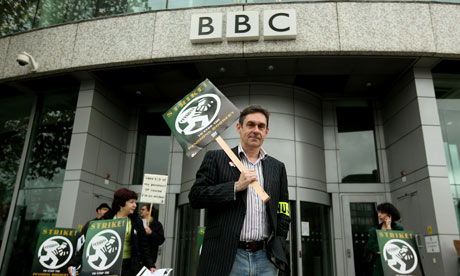Guardian 6th November:
BBC strike: a dozen journalists, a homemade placard and a former Play School presenter on the picket line
Newsnight's Paul Mason admits: 'It's not the miners' strike'
Maev Kennedy guardian.co.uk, Friday 5 November 2010 16.06 GMT

Paul Mason, Newsnight's economics editor, on the BBC picket line. Photograph: Oli Scarff/Getty Images
By 9am when the BBC's flagship radio news programme, Today, should have been signing off in traditional style by crashing the pips, the ragged line of about a dozen National Union of Journalists pickets was bagging support from passing traffic.
There were flashing headlamps from a No 22 London bus; a tooted horn from a white catering lorry, and one small grey van which, after a chat with the striking journalists, turned back from the gates - to the pickets' surprise.
Meanwhile hundreds of BBC workers had streamed past them into the Wood Lane Television Centre, the heart of the corporation's radio and television news operation, a few looking slightly awkward, most barely registering the pickets. "I'm not in your union, but I support you guys," one man said - but went in anyway.
Helen Boaden, the director of news, smiled and said hello as she walked through, too briskly for the pickets to get out a "BBC pensions robbery" leaflet to offer her. "She's presumably in there now doing all the news programmes by herself," said Ian Pollock, chair of the NUJ London branch at the BBC. "She was very pleasant - but she's still scabbing."
They tried harder to engage with the soon-to-be-redundant deputy director Mark Byford, but he strode through. Peter Horrocks, director of the World Service, paused for long enough to assure them their cause was hopeless.
Paul Mason, Newsnight's economics editor, joined the picket line in battered jeans and pinstripe jacket, insisting: "What we're on strike for is the right to take a pay cut so we can pay more into our own pensions." It was not an issue arousing tremendous public sympathy, he agreed as passersby, clocking that his was the most famous face on offer, hurried on by. "This is not the miners' strike," he said.
The solitary homemade placard, a beautifully lettered "Lose 1/3 of my pension? Of course I'm on strike", on drawing paper nicked from his children, was carried by Ian Jolly, who works for the BBC news website. He spent his very first day as a professional journalist on strike, joining the picket outside the Eastern Daily Press in Norwich in 1978. "This [the BBC strike] has been a very hard sell," he said today. "A lot of people think, 'you're in work, what are you moaning about?' "
A group of pensioners arrived on a coach, a University of the Third Age group from St Albans booked in months ago for a studio tour. "If I was working for the BBC I'd be out on this picket line too," Peter Dodd said staunchly, after a career as an engineer and technical officer in which he was made redundant five times. "The whole state of British employment today is very worrying."
Two slightly bemused Dutch tourists, Lena and Marcel Dam, arrived to join the tour. They got to London on Tuesday, in time for the tube strike. "For us it is very interesting to find Britain like this," Marcel said, guffawing.
Chris Tranchell cheerfully introduced himself as a flying picket, a one-man delegation from Hammersmith and Fulham trades council where he represents the actors' union, Equity. But it turned out he knew the Wood Lane building very well indeed: from 1976 to 1984 he was a regular presenter on Play School. His bosses may already have had his number, since the day he whistled, while narrating a Christmas tree story, the air to O Tannenbaum - or The Red Flag, as it is better known at Labour conferences. He sealed his fate during the miners' strike, when he appeared on the front page of a trade union journal, collecting toys for strikers' children outside Hamley's in Regent Street. He was invited to an ominous lunch with his producer. "The word miner was never mentioned. She told me, 'Chris, your face is no longer coming at us through the camera,' and that was that.
"The cuts are happening everywhere you look. Solidarity among workers is all we've got".


No comments:
Post a Comment